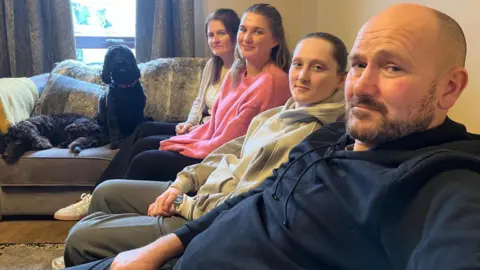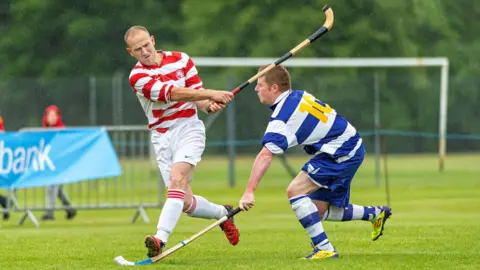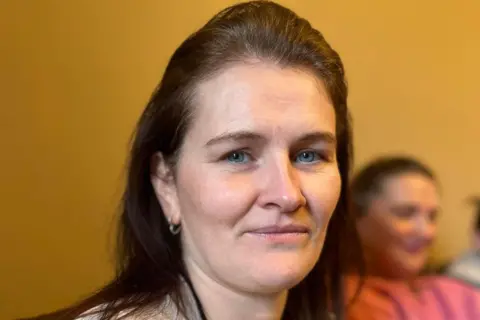Shinty player with MND fears for family's future
 BBC
BBCA former shinty captain says he is wracked with worries for his family's financial future after being diagnosed with Motor Neuron Disease (MND).
Dad-of-four Lachlan Campbell, of Spean Bridge in the Highlands, spent years building up his joinery business but has had to give up work due to the terminal neurological illness.
MND stops signals from the brain reaching the muscles and the 47-year-old was unable to cope with the physical demands of his job.
The disease has badly affected his speech, and Lachlan says he has struggled to be understood when seeking financial support.
Lachlan was diagnosed with MND three years ago.
"My voice totally went. I was dropping things and being clumsy - I thought I was losing my mind," he says, recalling the early warning signs he had the disease.
"When I was diagnosed it was the news I was dreading – for me it was the worst case scenario."
Lachlan is well known in shinty circles as a captain of Lochaber and for playing in the game's premier league.
He competed in various cup competitions, including the Camanachd Cup and appeared in two MacTavish Cup finals.
Lachlan later went on to coach Lochaber's junior sides and represented Scotland in games against Ireland.
He was also a keen golfer. Outside sport, he worked hard to build up his joinery business.
MND has left him unable to cope with the physical side of his work.
He says: "I fall quite regularly so it's a matter of time until I really hurt myself.
"I had to make a decision to do what's best for the family because if I injure myself the recovery will not be easy."
MND causes muscle weakness and wasting. It can rob someone of the ability to walk, talk, swallow and breathe.
 Neil Paterson
Neil PatersonLachlan says his biggest fear is the financial impact on his family.
With his wife Leeann he has three daughters, Molly, 24, Regan, 23, Lacey, 18 and a son Max, 21. All but one of their children live at home.
There are grants available, but Lachlan says the funding is limited.
He says he has tried to apply for statutory benefits but has found the process a huge challenge - made even harder because he has difficulty talking.
"I had a real issue trying to apply for the Personal Independence Payment (PIP) when I was first diagnosed and my mental state wasn't good, and then trying to have a long conversation with someone who couldn't understand what I was saying – I just gave up in the end," he says.
Lachlan believes he has lost two years' of financial support.
He says: "If you have a disease like this then PIP should be offered to you – you shouldn't have to claim it because it's not easy.
"Once you stop earning, all the bills are still there, even if you have an incurable disease, the bills keep coming."
The UK's Department of Work and Pensions (DWP) said it could not comment without certain personal information being provided.

Leeann works part-time as she balances caring for her husband.
She says: "Knowing that he's going to get worse is a horrible thought – it keeps me awake at night.
"It worries me how I'm even going to cope looking after him when he gets to a certain stage.
"Every day I think if he can get up and go out and do whatever he does then I can't just sit about and be sad and angry – I still have to keep going too."
Leeann is also daunted by their financial situation and worries about when she will have to give up work and care for Lachlan full-time.
She says: "Do you potentially have the threat of losing our home as well, on top of your husband not being well and there's nothing you can do about it?"
Lachlan has thrown himself into raising awareness about MND and fundraising. He has raised more than £10,000 so far for families affected by the disease.
The average life expectancy of someone with MND is just 18 months from diagnosis.
There is currently no cure or meaningful treatments.
Lachlan says although his diagnosis has robbed him of so much, including playing his beloved shinty, he is determined to remain positive and spend as much time with his family and secure their financial future.
He says: "Really the only thing that's important is to try and enjoy the life I've got left and make sure my family are enjoying it with me."
Leeann adds: "I thought we had a long time together where we would grow old together, see the kids have kids, get married - all that kind of stuff.
"But knowing that probably isn't going to happen, it makes you really appreciate the time you've got with each other."
Inspirational dad
Regan says her dad's attitude is inspirational.
She says: "We can't sit being all doom and gloom when he's the one that's actually unwell and he's the one being positive so we've just got to try and do that as well."
Her sister Molly adds: "It's such a horrible, horrible disease.
"You're literally just watching someone lose themselves right in front of your eyes and there's literally nothing you can do."
MND Scotland said the disease put huge strains on families.
The charity's Angela Harris said: "We are here to support people so they are not on their own with it at all.
"We would strongly advise anyone whose got a diagnosis or is affected in this way to come to MND Scotland and talk to the support team."
Dr Madina Kara, director of research at the My Name'5 Doddie Foundation, said work was continuing to find a cure.
